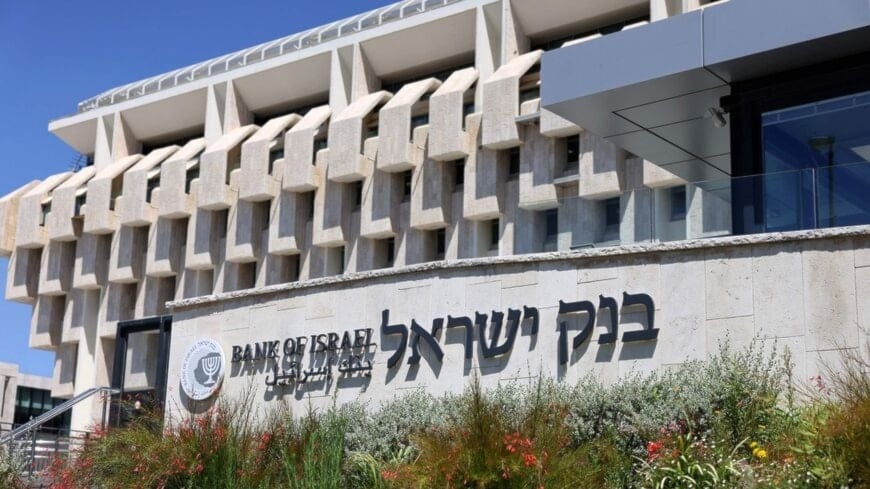Official slams Israeli central Bank chief amid economic downturn
Israeli parliamentary finance committee chairman calls out the Bank of Israel's chief as a "bad governor" amid a spike in inflation.
-

This picture taken on Aug. 23, 2022, shows a view of the exterior of the headquarters of the Bank of Israel, the occupation's central bank (AFP)
The longstanding rift of over a year between the Israeli finance committee chairman, Moshe Gafni, and central bank governor Amir Yaron intensified on Monday when Gafni stated that the Bank of Israel chief did not merit a second term.
Gafni has been a critic of Yaron since mid-2022 when the occupation central bank initiated an aggressive interest rate hike cycle to combat high inflation.
Against the backdrop of economic uncertainty arising from the confrontations with the Palestinian resistance, Israeli Prime Minister Benjamin Netanyahu extended an offer of a second five-year term to Yaron last week, and Yaron accepted. The decision is now pending cabinet approval.
Read next: Bank of Israel to sell up to $30 billion to stabilize shekel rate
"His (first) term is characterized by hurting the weak and constantly raising the interest rate and the burden on the public is terrible," Gafni said at the finance committee's meeting. "He is not a good governor. He is a bad governor. The government is making a bad decision."
The Bank of Israel responded to Gafni, saying it was "important that the dialogue between the Knesset (parliament) and the government and public institutions such as the Bank of Israel be professional and respectful and not be characterized by toxic and divisive discourse, which is inappropriate, certainly at this time".
Israeli economy crashing slowly
The interest rate was raised to 4.75% from 0.1%, causing a surge in mortgage and other loan rates. While interest on consumer bank accounts initially saw minimal increases, Gafni believed that the Bank of Israel did not exert sufficient pressure on banks to assist consumers. Additionally, last month, at the beginning of the Israeli aggression on Gaza and the launch of Operation Al-Aqsa Flood, he advocated for rate cuts.
Read next: Israeli media: the Israeli economy has lost roughly $1 bln
The central bank emphasized that maintaining price stability is crucial for the smooth functioning of the economy. It asserted that the interest rate hikes were essential in preventing the onset of rampant inflation, which would disproportionately harm the most vulnerable segments of the settler population and inflict even greater damage on people and businesses.
"It would be appropriate for the chairman of the finance committee to see the good of the entire economy, to be knowledgeable about the basics of the economy and also what is happening outside of Israel," the Bank of Israel said.
Israeli debt rose by $8 billion
Earlier this month, the Israeli occupation successfully raised approximately 30 billion shekels ($7.8 billion) in debt since the start of its aggression on Gaza, as reported by the Finance Ministry on November 14.
Out of the total amount, around 16 billion shekels were raised through dollar-denominated debt in international markets, highlighting the Israeli occupation's efforts to seek financial support on a global scale. In addition to this, the Finance Ministry conducted a weekly bond auction in the local market, resulting in the acquisition of an additional 3.7 billion shekels.
The Israeli occupation's financial capabilities "allow the government to fully and optimally finance all its needs," stated the accountant-general division of the ministry as the debt continues to pile up just short of 40 days into the aggression.
Read next: Israeli GDP growth expected to shrink 1%; debt-to-GDP ratio above 65%

 4 Min Read
4 Min Read










